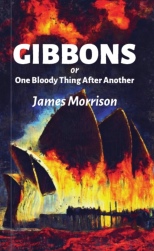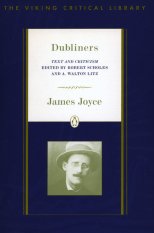Gibbons, or One Bloody Thing After Another by James Morrison.
My rating: four stars
There’s a bit of trepidation I feel in reviewing this one, as its author, a noted issuer of lamentations about terrible publishing design choices, is someone I know. (Inasmuch as sending him the occasional book and interacting on the sewer/binfire that is Twitter (amongst other places in the search for a replacement for said sewer/binfire) can be adequately called “knowing”.)
James was kind enough to send me a copy of the work (available now through Orbis Tertius Press!) as part of a by-mail book swap.
I subscribe to the idea, borrowed from Lester Bangs as he appeared in Almost Famous guise (god rest ye, Mr Hoffman) that one should be honest and unmerciful where reviewing is concerned, though it’s tempered with something about not being a dickhead for the sake of the easy snark. I used this approach when I was reviewing music, and I apply it to my personal writing as well, and hope that I don’t come across as a dickhead seeking cheap laughs. I want to touch on the way I honestly felt about things, in the hope that even if I think something sucks, the articulation of my reasoning would be at least beneficial should a creator ever stumble across this windswept part of the internet.
To end this rather self-indulgent sidebar, I can say that happily, neither snark not merciless filleting is required as far as Gibbons is concerned because it’s bloody great. Which is probably a fait accompli, given that the work is described as:
… the discontinuous narrative of an Australian family in short stories, including glass eyes, false mermaids, inadvertent death, nuclear weapons, and the accidental destruction of the Sydney Opera House.
It’s quite something. And yes, all of those things are in there (and more!) and no I’m not going to explain how they feature. What Morrison does through the book, though, is exhibit a deft touch in the way he describes the family Gibbons throughout the ages. They appear stapled to matters of moment in Australian history, parts of which – murder and Maralinga testing – have been adapted from the factual record. (I know, because I looked up the story behind one of the tales on Trove, just to see if it was a real story.)
I enjoyed the moments when, with each story, I could lay my finger on exactly when the events occurred, which made other parts click into place a little more firmly. I liked the polyglot’s eye that honed the tales, which informed but never veered into showing off.
What I’m saying, I guess, is that there’s something of the Peter Carey in these works, in terms of creating a fictionalised familial history that draws on real life to fuel Morrison’s observations. The voice is laconic, and the observations tiny, though with the sense that these minor moments ripple on until, years later, the Sydney Opera House is fucked.
This was right up my alley and I loved it.
Dubliners by James Joyce.
My rating: three stars
Or, as it might be otherwise titled, Gettin’ Squiffy by the Liffey.
This is the first time I’ve actually made it through Dubliners. I’ve tried to read it a number of times through the years and I’ve never been able to get very far along. This year, I’m reading it as part of an effort to read All Of Joyce (well most, because FUCK those letters to Nora Barnacle, man) and it’s really not the most auspicious beginning, because I’ve gotta say, I didn’t particularly enjoy it.
The stories are absolutely fine. But because I had read Ulysses before this, I think I’m missing the sense of untidy beauty, of messy human joy that runs through that work. These short stories act perfectly well as thumbnail sketches of a number of Dublin’s inhabitants – priests, prostitutes and the pissed – but they don’t feel as if they have a beating heart. There’s moments where the prose sings, but for the most part it’s stuck in the gutters, spewing.
This edition contained a wealth of background, of critical analysis, of forensic dissection which didn’t do anything to change my mind. I admire Joyce’s skill at creating these moments, and I appreciate how scandalous some of his presentations may have been. But they’re clockwork set-pieces, dioramas that have no magic.
I wish I felt differently.
If you’re after some good bookish times, please check out my profile on TheStoryGraph.
If you’d like to buy me some books to review, there’s a wishlist over here.


